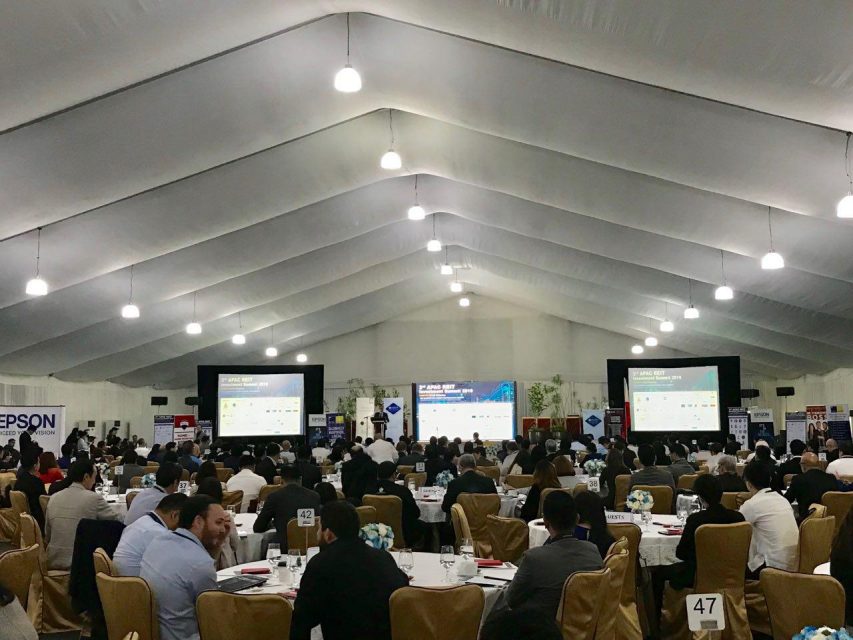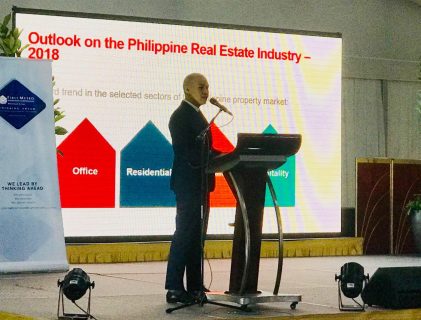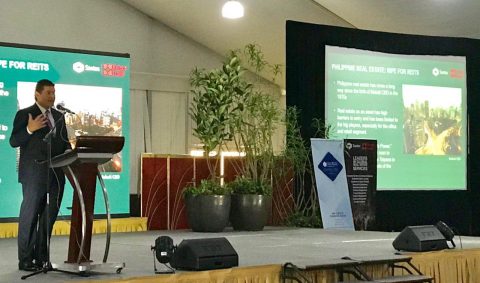
By Caesar Vallejos
OPEN FOR BUSINESS, Eagle News Service
Chief property experts and players across the Asia Pacific (APAC) region declared that the Philippines is ready and ripe for Real Estate Investment Trust (REIT).
REIT is a publicly listed corporation that allows investors to buy shares in recurring income-producing real estate assets such as office buildings, hospitals, warehouses, hotels and shopping malls.
In the Philippines, it is a stock corporation established in accordance with the Revised Corporation Code and the rules and regulations promulgated by the Securities and Exchange Commission (SEC) principally for the purposes of owning income-generating real estate assets.

At the APAC REIT Investment Summit 2019 held last June 18, 2019 at The Tent at Soliare, Allan Zhang, Vice President for Business Development, Public Policy and Research of the Asia Pacific Real Estate Association Limited (APREA) cited the positive outlook for the Philippine REIT market.
Growing momentum for REITs
“The momentum is happening and the regulators are making amendments on the legislation specially on the tax part and the investors are waiting for that. Fund managers are keen to invest in the REIT market in the Philippines,” he said.
“This is the chance for the Philippines to develop REITs because it can provide a great attractive return. It can also attract more investors from other countries. The Philippines can leapfrog to be a model for the REITs market in the world and in Asia Pacific,” Zhang added.
Zhang said that REITs are “more stable and sustainable than private real estate.” According to Zhang, REITs provide more transparency and are more sustainable.
“If the investors have more access to information, they are more comfortable to invest in the market,” he added.
On a long-term perspective, “the performance of REIT is better than listed real estate for the past 10 years with high return and lower volatility. We can see that in the Philippines where the performance of real estate is quite high,” Zhang said.
“In the past 18 years, REITs in Asia Pacific provide an average of 6.2% dividend per year for investors. It’s a good product to invest in,” he explained.
Countries, specially emerging economies, are having REITS in their market. “The demand for REITs is large because it provides stable dividends,” Zhang.
He also cited the REITs are transformed as a service, “expanding to cover more economic and social activities; evolving to cover all investment quadrants and more investment style options; and growing cross-border investments.”
An APREA study noted that “REITs help improve Asian economies as they attract foreign capital into the property sector, unlock capital, and generate additional jobs for the local economy.” REIT proceeds, according to the study, are often used to refurbish and reposition real estate properties, resulting in an improved environment for both developers and tenants.”
Democratizing wealth in PH
Over 200 industry professionals, chief property experts and players across the region gathered at the conference with the theme, “REIT: Blueprint for a Robust Philippine Capital Markets.”
In Asia, the “REIT industry was estimated to be valued at $140 billion and $1.4 trillion in all parts of the world.”

While the Philippines have the REIT Law (Republic Act 9856) passed in December 2009 intended to “democratize wealth by allowing Filipinos to invest in the real estate market without owning actual property”, the REIT industry has not made great strides due to two major regulatory roadblocks: 12% VAT imposed on the transfer of real estate properties to REITs and the restrictive minimum public ownership (MPO) regulation.
“Thankfully, it (VAT issue) has been addressed under the TRAIN Law. The amendment to the tax code provides VAT exemption for capital contributions into the REIT,” Quisumbing Torres Partner, Atty. Alain Charles Veloso said.
However, Atty. Veloso said that the MPO issue is still pending. Currently the public float is at 67%. “This is way higher than the current public float requirement for a listed company and significantly higher compared to the REITs in other jurisdictions,” Atty. Veloso said. MPOs in Hong Kong, Singapore and in the region is only 10 to 25%.
At 67%, “the sponsor will essentially give up control once you transfer the property into the REIT and lose control over the REIT itself and ultimately over the assets of the company,” Atty. Veloso explained.
Fortunately, Atty. Veloso said the government is working on amendments to the Implementing Rules and Regulations (IRR). “They can amend it any time,” he said. Industry analysts expects SEC to issue an amended REIT IRR highlighting 33% MPO requirement in the next coming months.
The 33% MPO (a decrease from 40-67%) is an important consideration for sponsors. “You want to be able to retain control over the REIT because that is where your property will go – malls, hotels, office buildings that are currently yielding a steady stream of income annually – and you continue to manage these properties and as an asset developer, you want to be able to get the cash proceeds immediately instead of waiting for several years to realize your investment,” he explained.
“The REITs allow you to get the cash proceeds immediately while allowing you to retain control over the company that the owns these assets and that’s the REITs,” he said.
Without naming them, Atty. Veloso said that three major real estate developers have already incorporated the REIT company with the SEC as early as 10 years ago. “They are just waiting for the amendments to the IRR” before they could sell the shares to the public.
‘New People Power”

“REITs are attractive investment vehicle for any retail stockholders or the public. Typically, the man-on-the-street cannot afford to buy real estate as an investment because it is very expensive and difficult to manage and dispose,” Atty. Veloso said.
REITs allow investors to own these assets indirectly through the shares of the REIT company who own the company directly.
Unlike other publicly listed companies, REITs are mandated to distribute dividends every year. Atty Veloso said that “90% of its distributable income has to be declared as dividends every year. It allows investors to have a steady flow of income annually. REITs can attract a higher yield compared to bonds and typical treasury bills up to 6-8% and it is reflective of the growth of the real estate in the Philippines.
In a paper entitled, REIT HERE, RIGHT NOW, Joey Roi Bondoc cited data that the average dividend yield of the prime Asian REIT markets of Hong Kong, Singapore, Malaysia, Tawian, Japan and South Korea is at 4.8%.
Meanwhile, Rick Santos, Chairman and CEO of Santos Knight Frank, in his presentation, “Philippine Real Estate: Ripe for REITs”, described REITs as the ‘New People Power” that enables “the common man to invest side by side with the taipans in the largest real estate assets of the country.”







